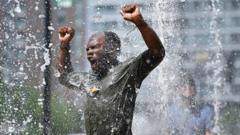The summer's first significant heatwave has struck eastern North America, resulting in numerous hospitalizations for heat-related illnesses. In Paterson, New Jersey, over 150 individuals fell ill during an outdoor school graduation ceremony, prompting the mayor to declare a state of emergency. Similar incidents were reported in Washington D.C., where six attendees were treated for heat-related conditions during a concert.
This heatwave is affecting over 160 million people across the U.S. Midwest and East Coast as well as parts of Canada, including Ontario, Quebec, and Nova Scotia. In North Carolina, more than 40 individuals sought hospital treatment for overheating, with local officials labeling the situation at graduation ceremonies a "mass casualty" event, resulting in the cancellation of further events.
With the high humidity levels exacerbating the risk, health experts warn that the prolonged nature of the heat event poses serious threats, particularly considering that some eastern cities are expected to see nighttime temperatures remain above 80°F (27°C). The National Weather Service is urging the public to take action against heat exhaustion and heat stroke, advising against sun exposure during peak hours and emphasizing hydration.
Forecasters predict potential record temperatures this week, especially in the densely populated Mid-Atlantic region and eastern Ohio Valley. In New York, temperatures could reach up to 101°F (38°C), equaling the highest June temperature recorded in the city since 1966.
Energy providers in the eastern U.S. have also called on residents to conserve power amid concerns about electrical blackouts due to increased air conditioning use. With extreme heat becoming a recurring summer issue in North America, this year’s surge may pose unprecedented challenges to public health and safety.




















